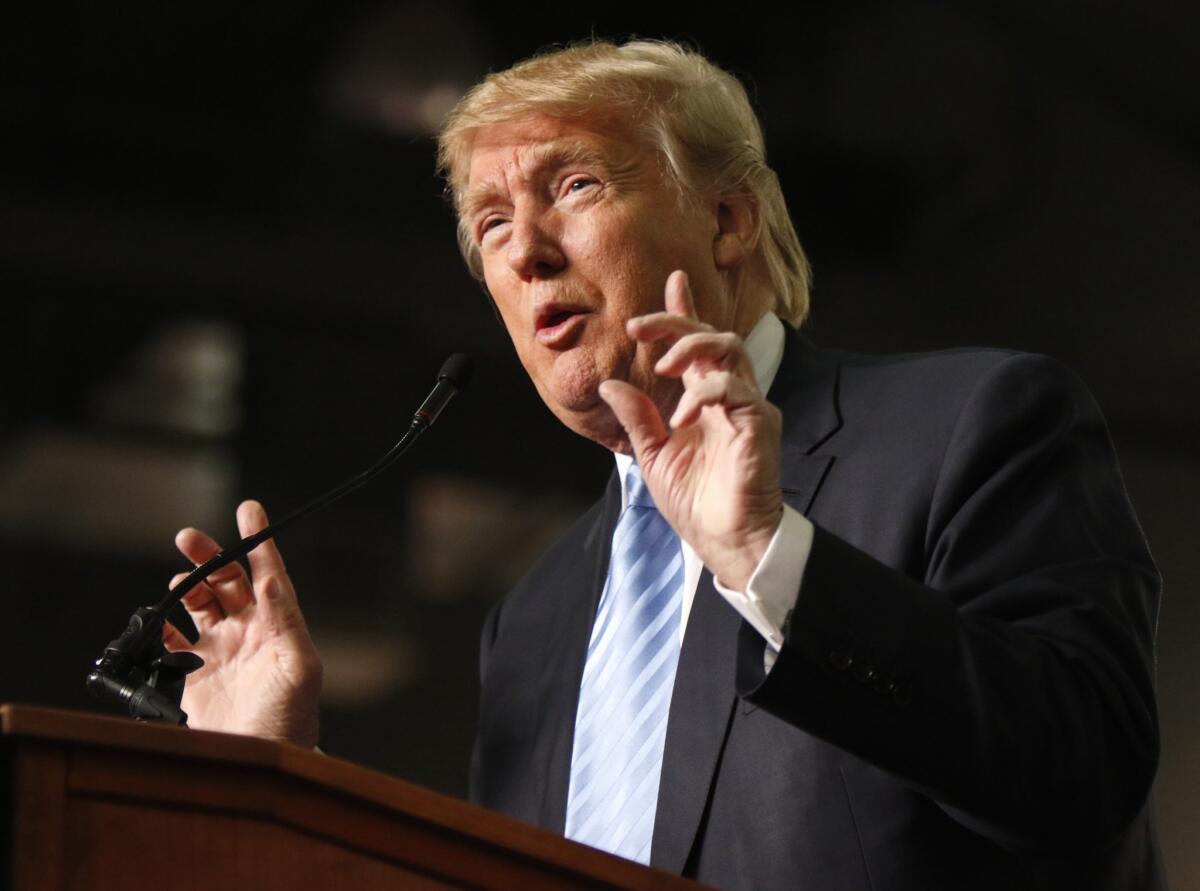Trump backers embrace ban on Muslims; ‘there is no line he cannot cross’

Republican presidential candidate Donald Trump speaks in Columbus, Ohio on Nov. 23.
- Share via
When Donald Trump called for a ban on allowing Muslims to enter the United States, he was roundly denounced by many other Republicans — not only rival presidential candidates (Jeb Bush called him “unhinged), but House Speaker Paul Ryan (who said, “This is not conservatism”) and former Vice President Dick Cheney (who said Trump’s idea “goes against everything we stand for”).
But that doesn’t appear to have damaged Trump’s standing among Republican primary voters. Instead, in the past few days, Trump has actually risen in several polls, just as he did after earlier controversies.
A CBS News/New York Times survey released Thursday found Trump commanding the support of 35% of Republican primary voters nationwide, his highest result in that poll all year.
In the past few days, Trump has actually risen in several polls, just as he did after earlier controversies.
A Fox News poll in South Carolina yielded similar results — and Fox said Trump’s numbers rose measurably after he called for the ban on Muslims. (Both surveys were conducted before and after Trump made his statement Monday, but unlike Fox, CBS and the New York Times did not release their before-and-after results.)
“Support for Trump increased eight points after his statement, from 30% the first two nights vs. 38% the last two nights,” the cable channel reported.
It turns out most Republican primary voters — who are, of course, the most conservative slice of the electorate — agree with Trump that the danger of jihadist terrorism calls for draconian measures.
An online survey conducted by Bloomberg Politics on Tuesday found that almost two-thirds of likely GOP voters agreed with Trump’s proposal. (Among all likely voters, including Democrats and independents as well as Republicans, 37% agreed with Trump — a minority, but a sizable minority.)
Why is Trump’s call for a ban on Muslim visitors and immigrants so popular — even though it’s naked religious discrimination and quite possibly unconstitutional?
Simple: People are frightened. That was the prevailing mood among Trump supporters assembled for a focus group discussion in Alexandria, Va., on Wednesday.
“We have to do something,” explained Tina Collier, 65, a retiree from Arlington, Va. “I mean, we cannot keep going down this path. It seems to be becoming more dangerous. I think we’re all scared.”
“And Trump is the only one who would come out and say something like this,” she added. “No one else would.”
“Christians aren’t trying to get into other countries and blow up their coffee shops,” agreed R.J. Wolf, 43, of Washington, D.C. “Muslims are the only ones who are doing it. People who are totally foreign to us? Yes, we need a temporary halt. That’s a reasonable position.”
They said criticism from other Republican leaders — an “elite” they denounced for failing to keep their campaign promises — didn’t dent their support for Trump.
“They were all looking for something to attack and waiting for that gotcha moment,” said Michael McCarthy, 48, a businessman from Annapolis, Md.
Not every Trump backer in the focus group supported his call for a ban on all Muslim visitors. And even some who did took pains to say they didn’t relish the appearance of religious discrimination. “I have great respect for Islam,” said Scott Mexic, 58, a businessman from McLean, Va. “But we need to look after our security first.”
The lesson for Trump? “There is no line he cannot cross,” said Frank Luntz, the Republican pollster who conducted the focus group.
“There is no sign of anyone leaving” the Trump camp, Luntz said. “He has found the magic formula…. They’re prepared to dismiss just about every criticism because they’re invested in his success.”
Trump’s support “is getting more and more intense,” Luntz said. “He is not going away. He is not disappearing.”
Twitter: @doylemcmanus
Follow the Opinion section on Twitter @latimesopinion and Facebook.
More to Read
A cure for the common opinion
Get thought-provoking perspectives with our weekly newsletter.
You may occasionally receive promotional content from the Los Angeles Times.










